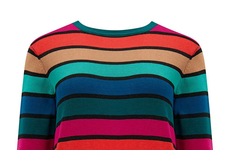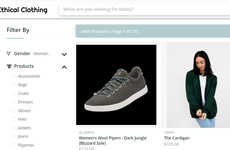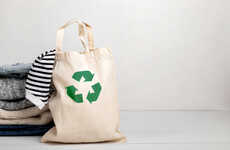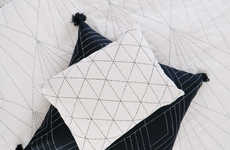
Amana Provides Training and Jobs for Women in Morocco
Tiana Reid — November 8, 2010 — Social Good
References: amanalondon & clearlyso
The clothing industry is often difficult for consumers to maneuver, especially those that don’t want to sacrifice either style or social responsibility. For those who like to follow trends, but are increasingly conscious of ethical business practices, accessible choices can be quite limited.
Amana is a fair trade fashion brand with ethical production practices. The delicate pieces are made by women in Ain Leuh, Morocco, using fabrics that are environmentally-conscious. Ain Leuh is a beautiful town located in the Ifrane Province on the Middle Atlas Mountains. Amana develops long-term relationships with the women in the Moroccan village by providing training and technical assistance, as well as fair wages, safe working conditions and advance payments. Amana works according to the International Fair Trade Association (IFAT) guidelines, but isn’t part of IFAT officially. After two years of trading, they plan to join IFAT. The women working for Amana are paid three times the minimum wage of Morocco.
Amana’s beautiful, yet minimalist clothing, is classic and trendy. It’s easy to see that both mothers and daughters would enjoy Amana’s collections equally. Using eco-friendly fabrics such as organic cotton, organic silk, tencel, hemp, organic wool, and recycled fabrics, Amana’s hand-made designs have minimal negative impact on the planet. However, since Amana’s market is in the United Kingdom, transporting the goods from Morocco to London creates a significant amount of carbon emissions. Amana delineates its environment policy on its website, which states that they offset the carbon emissions of transportation by donating to projects that reduce carbon emissions.
Amana’s ethical practices make it clear that intricate designs, quality goods and responsible fashion can exist simultaneously and successfully.
Contact Information:
Amana Website
PO BOX 57539
London
NW6 9FL
Telephone: +44 (0)207 209 4818
Amana is a fair trade fashion brand with ethical production practices. The delicate pieces are made by women in Ain Leuh, Morocco, using fabrics that are environmentally-conscious. Ain Leuh is a beautiful town located in the Ifrane Province on the Middle Atlas Mountains. Amana develops long-term relationships with the women in the Moroccan village by providing training and technical assistance, as well as fair wages, safe working conditions and advance payments. Amana works according to the International Fair Trade Association (IFAT) guidelines, but isn’t part of IFAT officially. After two years of trading, they plan to join IFAT. The women working for Amana are paid three times the minimum wage of Morocco.
Amana’s beautiful, yet minimalist clothing, is classic and trendy. It’s easy to see that both mothers and daughters would enjoy Amana’s collections equally. Using eco-friendly fabrics such as organic cotton, organic silk, tencel, hemp, organic wool, and recycled fabrics, Amana’s hand-made designs have minimal negative impact on the planet. However, since Amana’s market is in the United Kingdom, transporting the goods from Morocco to London creates a significant amount of carbon emissions. Amana delineates its environment policy on its website, which states that they offset the carbon emissions of transportation by donating to projects that reduce carbon emissions.
Amana’s ethical practices make it clear that intricate designs, quality goods and responsible fashion can exist simultaneously and successfully.
Contact Information:
Amana Website
PO BOX 57539
London
NW6 9FL
Telephone: +44 (0)207 209 4818
Trend Themes
1. Ethical Fashion - Amana's fair trade fashion brand exemplifies the growing trend of consumers demanding ethical production practices in the clothing industry.
2. Eco-friendly Fabrics - Amana's use of environmentally-conscious fabrics like organic cotton, silk, and recycled materials reflects the trend of sustainable and eco-friendly fashion.
3. Carbon Offsetting - Amana's commitment to offsetting carbon emissions by donating to projects that reduce carbon emissions aligns with the trend of businesses taking steps to minimize their environmental impact.
Industry Implications
1. Fashion - Amana's fair trade fashion brand sets an example for the fashion industry on how to incorporate ethical production practices and sustainability.
2. Textile and Apparel Manufacturing - Amana's focus on training and providing jobs for women in Morocco highlights the potential for the textile and apparel manufacturing industry to create social impact through fair trade practices.
3. Sustainable Fashion - Amana's use of eco-friendly fabrics and commitment to offsetting carbon emissions contributes to the sustainable fashion industry's efforts to reduce its environmental footprint.
2.2
Score
Popularity
Activity
Freshness























